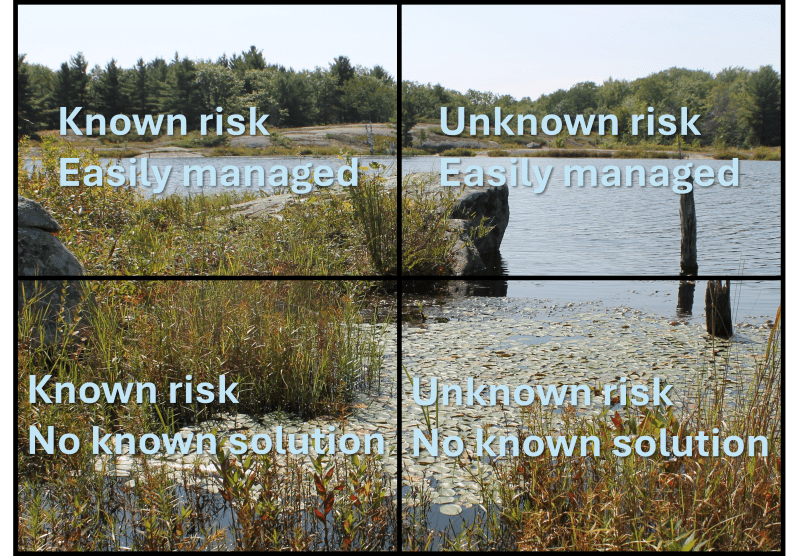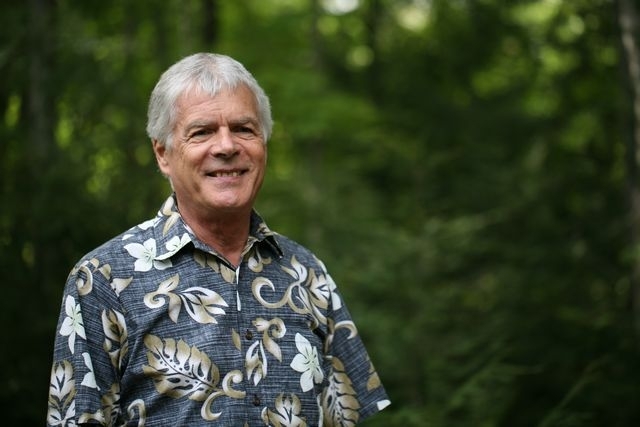Caring for Muskoka’s environment with the unknown unknowns.
Unknown unknowns cause problems we cannot anticipate, problems that can be small or very large.
By Peter Sale.

On Feb. 12, 2002, then U.S. Secretary of Defense Donald Rumsfeld famously said, “There are known knowns. These are things we know that we know. There are known unknowns … things that we know we don’t know. But there are also unknown unknowns. There are things we don’t know we don’t know.”
Unknown unknowns cause problems we cannot anticipate — problems that can be small or very large. They exist whether one is considering the risks associated with international relations or risks to a natural environment.
There are environmental risks we know about and risks we do not know about. And there are risks we know how to manage and risks we do not know how to manage. The scariest risks of all are the ones we do not know exist, with effects we do not know how to manage — the unknown unknowns.
A primary goal of effective watershed management is to know enough about how the watershed functions and what human actions might be stressing it that the number of unknown unknowns is minimized.
Do we know enough about Muskoka’s watersheds or about the things we are doing to them?
At its simplest, caring for our Muskoka environment requires we avoid human activities that stress or degrade that environment. Whatever the issue, the process is the same: identify the environmental problem and the cause, find ways to prevent or mitigate that cause.
Ideally, managers should identify problems early or anticipate future problems by monitoring risk. Municipalities, community groups, industry and provincial ministries all monitor our environment to anticipate problems and identify possible causes. Relative to many places, our watersheds are very well known.
And yet, I fear despite all the effort in environmental monitoring, we are not doing an adequate job in reducing the likelihood of unknown unknowns.
Despite the notable efforts by many people to monitor our watershed, little effort is devoted to evaluating the results. And there are noticeable gaps in the monitoring being done; gaps that are not being plugged. MWC’s Report Cards attempt to remedy the lack of evaluation, but we also need to address the gaps.
For example, while there is extensive monitoring of water quality in our lakes, we collect very little data on the condition of our wetlands or the health of our forested lands. With the shifting climate leading to drier summers and falls, are our wetlands being dried out and becoming less effective as the filters that keep our waterways clean? We don’t know.
Similarly, we know the Spiny water flea invaded Muskoka lakes in the 1970s and our use of road salt is making some lakes much saltier than they should be. Both changes are likely to have substantial impacts on important zooplankton species, but there is little monitoring of zooplankton, nor of the consequences for lake food webs that loss of grazing zooplankton can cause.
Salt pollution of lakes and effects of Spiny water fleas are known unknowns — we know these problems exist, but we know next to nothing about the severity of the changes being caused nor how to deal with them.
And there remain the unknown unknowns. Why are more lakes developing algal blooms now than in past years? And what unexpected thing is going to happen next?
The extensive monitoring being done needs to continue. We need to pay more attention to the health of our environment than we have been doing and look for gaps in our monitoring and follow up when something like a new invasive species or a change in weather patterns appears. If we do, we will be better able to care for our environment in this challenging time.

First Steps on the Path to IWM, a series from the Muskoka Watershed Council, continues building information about Muskoka’s precious but fragile environment. This is article #12, authored by Peter Sale, who also edits the series. A director and former chair of Muskoka Watershed Council, Peter is a retired aquatic ecologist and a resident of Bracebridge.
